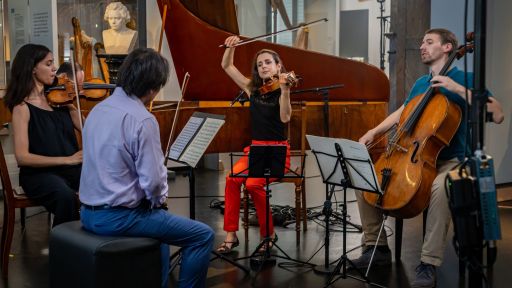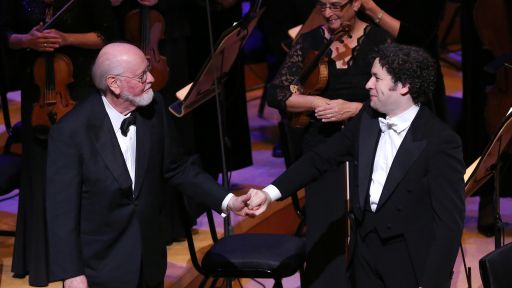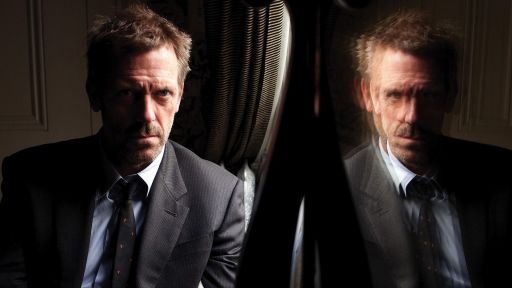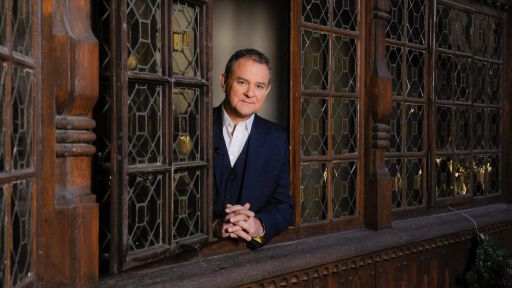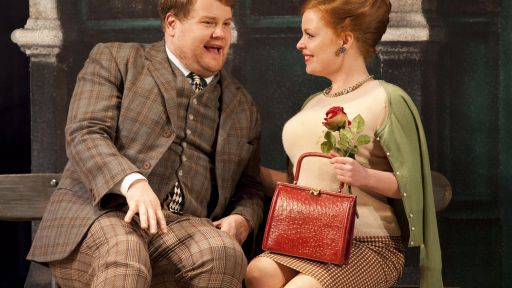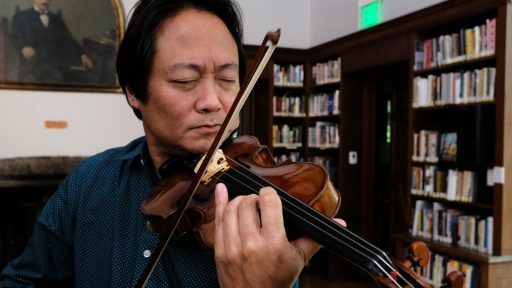Marin Alsop and Scott Yoo discuss their careers, composing, the pandemic and what they love about conducting.
Features
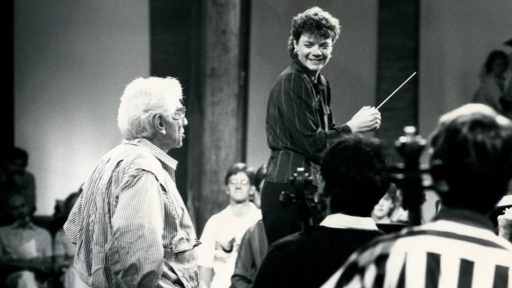
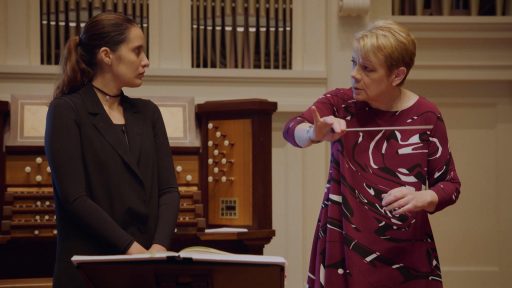
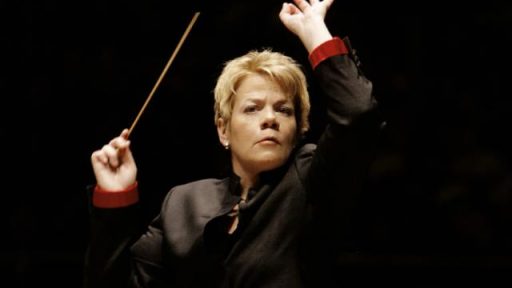
I mean obviously Marin you've been such a champion of of bringing attention to music that the rest of us don't know about you've done that your whole career. Are you still doing that in in Vienna, or is there kind of an appetite for you know -- we need to hear our our Mahler every year and we need to hear our Brahms and our Bruckner. How does that work for you?
Well, that's a such a wonderful question because I think part of the the draw for me about the radio symphony orchestra here in Vienna was the repertoire, because they play a lot of contemporary music, but it's not the contemporary music that I been championing. So I'm getting to know all of these European composers, lots of Austrian composers. You know, for me as an artist, this is what's exciting, you know, and I think you agree because your career is similar, that, you know, the more we can explore and expand our artistic vision, the healthier we are as artists.
So here it's fascinating because as a radio orchestra, we get to play a lot of new music. So lots of crazy things here.
That's nice. So you're encountering composers you've just never heard of?
Oh, absolutely, without a doubt and not just contemporary composers, you know, people like Hans Rott and, you know, composers that I wouldn't have been familiar with at all.
And so it's fun for me. And it was the same when I went to Brazil, you know, getting to know all of these south American Brazilian composers.
I mean, it was like a treasure chest, you know, that's what it feels like for me each time.
And then I get to explore all these different corners of the world.
And I think that for me, that then informs my, you know, Beethoven and my Brahms. Don't you find the more, the more new music you play, the more insight you into the old music, too?
The more new music I play, the more I realize that it's really hard to compose anything.
Yeah. Okay. I'm totally on board with you, because my respect for composers is it was always very high, but working on so many new works, I'm in awe. I really am. I wish I could compose. I mean, that would be a dream come true, but boy, I've tried and I have so little talent. It's unbelievable, but I agree a hundred percent.
Wow. You know, I find that, when you look at composers today, they're shackled by Beethoven was sitting on the shoulders of Brahms like an albatross.
I feel like any composer who's living today has 300 years of history weighing them down. And it feels like it's kind of unreasonable that somebody writing a string quartet today has to, has to somehow outdo Beethoven or Bartók or Schubert.
No, it's true.
People should be free to write. It's daunting. Exactly.
It is daunting. I think, I think that, I mean, but can you imagine being an author and going to write a novel, I mean, with the, with the volume and the quality of work out there, I mean, it, it is overwhelming.
I think the trick really is to try to find your voice, right.
And your authentic self, that's what appeals to me always about composers, new composers, that they have something that feels authentic to them, and it doesn't have to be original. You know, you don't have reinvent the wheel.
It just has to be authentic.
And it has to be from the heart because ultimately music, we want music to move people. And that's really our only, our only goal. Our only objective. I mean, I'm really curious Scott, I'm the child of two professional musicians, so I had no choice about playing the violin or playing the piano when I was little, how did you start playing the violin?
So, my father was an immigrant from South Korea going to university here, and he grew up listening to a lot of Heifetz records.
Oh, wow. So, and my mother -. No pressure. You had to sound like Heifetz, right? That was the goal.
I mean, you know, you might as well, you might as well imitate the best.
My mother heard, and this, this goes to show you how important, these youth concerts are. My mother, as a, girl heard Masuko Ushioda, who was a wonderful violin teacher at the new England conservatory, play a recital at her school and thought, I really like the sound of that. I'd like for my child to play that, whatever that is. And so between the two of them, I started playing the violin.
I don't know, I often think about what would've happened if I had started playing the trombone or, you know, the flute or, I mean, how different life would've turned out.
I mean, being a violinist, don't you feel like, like having a background as a violinist Marin, it kind of shapes who you are, not just what kind of a conductor you are, but who you are as a person. Right.
I mean, you like, you, you played first violin parts in string, quartets, you were used to leading as a teenager or even younger, so you already knew, knew how to do that. Right.
What if you had grown up being a violist, how, how would that have changed you as a person?
Oh, but there's so many Viola good Viola jokes in there that I could think of.
Well, but, you know, I do to think that being a string player period, you know, is a, is a huge advantage as a conductor because of course we can, we can relate and speak to the majority of the orchestra.
And I think the physicality of playing a string instrument also is conducive to, to the transition, to becoming a conductor, you know, just the, just the natural motion that, that we use as string players. And I think there is a definite bossy quality, especially about violinists.
Maybe if I were, had been a violist, I loved playing Viola actually quite a bit, but, I, I think perhaps I'd be more collaborative, but that's interesting.
I don't know. I do think that did, did you always want to conduct Scott or, or was that something later in, in your life?
No, it was, when I was in high school, I got the opportunity to play with the orchestra of St. Luke's and Zuckerman was conducting I'm sure you've, you've played, you know, dozen concerts with him.
And, um, I was really excited about it. And then he said, you know what,, it was a Bach concerto. And he said, you know, Scott, why don't you just play conduct thing yourself? And I'd never done that. Wow.
And at some point, like I just bent down because the orchestra was a little loud and, and they just went and, and I thought, oh my God, this is some, you know, it's just a really strange thing that you move your body.
And then suddenly the sound changes.
It's like this kind of whole body pheromone or something thing, there's something so -. Strange about it. Right. Right.
And, and so I, I was hooked, you know, at that point, how did you, how did you get your, your start? Cause you started really young.
You were kind of very, very young, right.
It's a good thing I started young, right.
Because it took a long time to get - well as a, as anything it's a, the strange phenomenon of being quite expert in one area. And then suddenly you're a, an amateur, you know, you're a beginner, when you step on the podium and, and how do you, how do you gain experience? I mean, that's such a tricky, catch 22, but I always wanted to conduct, I mean, from the time I was about nine years old and I saw Bernstein at a young people's concert, again, you know, how important these concerts are for kids, because they really, you have no idea what, you know, what you're bringing out in a child. So I, I, I find them so valuable, but, um, yeah, you know, it was, for me, it was a matter of really just bidding my time until I got tall enough and could talk people into playing with me. And, of course I just, I just did it because I loved it. Absolutely no other reason.
And I do feel that conducting is in a way about connecting with people and connecting with a lot of people at once and, and also being the conduit to enable people to be the best they can be. And those things really appeal to me in life.
So I feel I'm, I'm sure I'm sure we're on the same page and feeling extremely, extremely fortunate to do what we do and not only do what we do, but get paid for doing what we do.
Oh, oh my God. It's interesting to hear you talk about conducting. I mean, obviously you're, you're one of the more eloquent conductors maybe ever.
What, the way you describe the field, if you stripped out the music part of that, you could, you could think that this is somebody talking about leading an army or leading a corporation. I mean, when you talk about leadership, there are certain things or leading a baseball team for that matter. I mean, oh for sure. There's certain, there's certain things that are universal in the human experience and conducting is just the, it's just the, sort of the extreme musical example of that. But this is something that, that carries across to being the coach of a high school lacrosse team. I mean, you know, motivating people and getting them to see it your way.
Isn't that interesting?
No, absolutely. And I, I think that, you know, it's an interesting question because sometimes people say, well, what really does a conductor do?
And after I say, gosh, I'm not really sure. No, but I, you know, it's, it's so abstract.
It it's really about, about leadership, as you said, it's about, it's about motivating people and hopefully inspiring them in different ways. The great thing though, about conducting, which you don't find in something like leading a corporation is that we have this incredible vehicle that is transformational of the music. We have the music that we're serving.
So we're not only getting that, that thrill of leading and motivating people, but we actually are in the service of great beauty as well.
So for me, it's sort of, of the best of all, all possible combinations of things.
Right? Absolutely. And you, and, you know, it's so interesting to hear the same orchestra perform under different leaders. Oh yeah. How different they can sound. I, I think this is something that, that maybe the general public, we, we sometimes get that, that, that person up there, whether it be a Marin Alsop or someone else, changes how that orchestra sounds, even without saying a word isn't that isn't that strange.
This is true. And I think that that if any member of the public, non musical, you know, not musically educated necessarily came to say a conducting seminar and watched five young conductors conduct, the same orchestra, the same piece, any one of them would be able to hear the difference because there's a physical reaction that people have. It's like, it's like the way you react to someone shaking hands with you, you know, you're forming an opinion, you're having a reaction.
You're thinking, oh, I wanna know this person. Oh, I don't wanna know this person. Oh, that person seems nice to, you know, all these things are going on.
And that's exactly what it's like when a conductor stands up. I mean, they're all unconscious reactions, but I've seen a young conductor stand up and, you know, not literally put their hands on the orchestra, but sort of metaphorically put their hands on the orchestra.
And the most gorgeous sound comes out or the harshest sound comes out.
And it's just absolutely fascinating to me because it's all about human interaction and conducting is really, it's really a metaphor for who we are as human beings. And, and that's what comes across. So I, I don't know. It's, it's, it's fascinating to me. And it's so multidimensional. We have to, we have to be doing so many things. I'm a multitasker at heart. Anyway.
I don't know if you were to, do you have like 17 devices going and, you know, but I like doing a lot of things at once. So conducting is perfect for me.
Marin that, that famous picture of you with Bernstein.
Yeah.
When was that taken? Like how old were you?
Oh, I must have been just 30, I think. Um, so, but I hope I look younger.
Oh, so that was, that was, that was, uh, 12 years ago?
Yeah, just a couple years ago. There you go. Yeah.
What did he, what, what do you remember most about your time with him?
Oh, you know, I remember almost every minute with him as though it's like a, I could play it back in my, as a slow motion memory.
But the things I remember, I remember of course, talking about music a lot and how passionate he was about our responsibility as conductors to be the messenger for the composer.
That that's our only responsibility, our number one responsibility, I should say, not our only responsibility.
Do you feel like he was talking almost as a, a composer's advocate being a composer himself?
I'm sure. I'm sure. On every level.
But I loved when he conducted his own music, he'd stop and say, oh, who wrote that? That's too hard. I always enjoyed that.
And I also think that Bernstein was a wonderful and, and probably one of the greatest storytellers of all time.
And he really impressed upon me that every piece of music is about storytelling. It has to have that narrative. And finally, I think this is just something I took away. I really, I really admired his, the way he lived his life in the world as a citizen of the world, you know, he would stand up for things he believed in, or whether I agreed with him or not.
I admired that ability to take a stand and to, to, you know, to be there and be counted and be a defender of principles. And so I, I really, I really loved that about him. And you know, hopefully I've been able to lead my life with that, as an example.
Do you find yourself repeating some of the things he told you now that you are the, you know, that you, you are passing, you're passing that on to, you know, the youngsters?
Oh, yes. Sure. I mean, I'm always, I'm always, you know, sharing things that he said. I mean, I always give him credit of course, because I don't want him to be mad at me still. And you know, so many of the little things he said, just come back in, in that moment of, of teaching and I think that teaching and learning are so, so close to each other that, I know that Bernstein adored teaching and I think he adored teaching because he loved learning. So that's something that I see every day.
Hmm. You do a lot of teaching. I mean, you're, you're kind of going back and forth, back and forth. So you, you spent a lot of time on an airplane.
I do. You know, and I've been teaching the flight attendants. No, I'm just kidding.
I am the head of the conducting department at Peabody, which is a wonderful conservatory in Baltimore. And I have a class of 11 students and I actually was just teaching them today from Vienna on zoom. You know, the pandemic kind of, got us into a new, a new way of being able to be present.
Nut I'll be back next week and be with them. So, so it works out pretty well for me. And of course I try to do master classes. I just, as you do, I think we, we wanna give back don't we, I mean, what's the point of having such a great life if you can't share it.
So I remember reading an interview with von Karajan and he said, what is conducting about?
And he said, it's about having the patience to tell a group of people the same thing over and over and over again.
And my question to you is what's the, what is the thing that you tell your students over and over and over and over?
I always say if it's too musical, I'll let you know.
You know, I mean, I think, I think that's the.
Oh, that's awesome.
That's the danger, right?
Is that people always hold back because that's the nature of, of what we, who we are as human being. Don't hold back, it's safer.
It's.
Safer. It's safer. It's Take a chance, right. Take a chance, you know, if it's too much I'll, you know, and, so far I haven't let had to let anyone know. So I, I think that's a, but yeah. It's pretty, it's a, it's, it's really joyful though, to teach. And are, are you able to do a lot of teaching?
You know, I don't, in the summers at a festival that I teach at in Colorado, we have two assistants. Usually, although during the pandemic, we just had one and they, they get to stand in front of the orchestra a lot because there's a lot of stuff going on. And usually what happens is they get intimidated because all of the, the, all the members of the, or orchestra, their friends that they're living with and they don't wanna mess up. Yeah.
And they start, you, you can kind of see that they're kind of, they start following the orchestra rather than leading the orchestra.
The orchestra keeps slowing down and you gotta just go out there and do it.
And you can't just be differential. You have to go out there and do it. And, and, I don't know. I mean, you've seen, you've seen far more young conductors than I have. I, I, I imagine you've seen that trend too. Where, where, where the kids are, they're just, they just become suddenly passive.
The orchestra doesn't know what to do.
So everything starts sort of grinding to a halt. Right.
Right.
And then, you know, you, and, and they, they get frustrated and then they start beating way too far ahead.
And then they've lost contact with the orchestra.
Right. I mean, I think the most important thing is to, as you say, stay connected, especially to the sound and, and remember that you're leading, not following, you know, I always tell my students, you, you have to, you have to hear everything, but listen to nothing so that, because as soon as you start listening, it's a reactive action rather than, rather than a leading action. So.
I think that's a great, that's a great, great, easy to understand yet, in some ways, esoteric point to, to listen to everything and listen to nothing at the same time.
Do your students get that?
I think they do, you know, but it takes a little bit of time as you say, they get in front of a big orchestra and either they're overwhelmed, you know, they can't hear anything because it's so much information coming at them or they they're waiting. They're constantly waiting for the orchestra.
And that's where I say, look, you have to hear everything, but don't listen, move forward, keep moving. Right.
And music has to have motion without pulse without motion.
It just doesn't, it doesn't live. Right. So, but this is so much fun that we're both on this program together and, and this series, isn't it.
I haven't seen you in a long time.
I told somebody that I was going to have this, this, this zoom call with Marin Alsop and, you know, they said, well, you know, do you guys hang out? And I, I was reminding my friend that, you know, conductors actually don't usually see each other because when you're in town, they're not and vice versa.
And that's the whole point is that everybody gets sort of shuffle in and out.
It's not like being a, let's say an oboist and, and, you know, doing a guest week with an orchestra, it's, you, you don't really have colleagues in an odd way.
You know? Yeah. It's strange. I don't know if you've found during the pandemic, something that I, one of the byproducts that I absolutely have so much is that I've done a lot of talks and panels with other conductors and been able to hang out and, you know, that was something I never, I never had the luxury to do that.
Tell me about your pandemic experience, Marin, I mean, do you feel like, like, I mean, what happened and, and when did you get shut down and, and where were you and what happened?
Yeah, I was in the middle of Mahler three, just at the dress rehearsal.
And I said, it was in Baltimore. And I said, you know, you might wanna film this because I don't think we're going, oh, no, we'll have a concert. And of course that was the end.
And and it was so shocking, but, you know, everyone was in the same boat, you know, everything just disappeared was canceled and all of my conducting weeks.
And then pretty soon my final season as music director in Baltimore was completely canceled. So that was that it was so strange. But you know, for me, , I'm fortunate in that, you know, I, I really was able to use the time to spend with my family.
Our son was about to enter his final year of high school, so we were able to, we were able to, you know, so, you know what I did, I said, oh, we just can't sit in this house forever. You know, that we're gonna go crazy or drive each other crazy. I said, you know, let's rent an RV and just start driving. So we, we went early in the pandemic and rented an RV.
And I don't know if you've ever driven an RV.
It's like driving a house and a boat at the same time. It's crazy. But we drove, we drove across the United States and we had our own sort of self-contained.
Yeah. And it was, it was, it was probably the most wonderful trip we ever took. I mean, there was nobody, anyway, nobody was out, we went all the way to Yellowstone.
We went all the way to Montana. Oh, fantastic. I mean, really amazing.
And also having some deep quality time, you know, I think because as, as, as conductors, as musicians who travel so much, you know, you lose touch with your, your what's really important in life, I think.
And so I was very fortunate.
And then we decided to come to Vienna and set up house here because I could work with the orchestra because it's a radio orchestra we could do recording. And so I got to know my new orchestra very well, which was really nice. Ao I mean, of course, I, I tried to spend a lot of time with young conductors online because I felt so I felt so terrible for them. I mean, so many of them just starting their careers, you know, and then all the debut weeks canceled and all this canceled and, you know, 90% of their income gone, all these things. I mean, we who are a little bit older can withstand that, you know, but these young didn't, you feel terrible for, oh gosh, it was so hard.
Anybody who was a freelancer. I felt like just was, I know, just decimated. And, and I, I heard about stories of some of my friends. They were, they were actually on, you know, on government assistance and everything and, and just sort of unthinkable and, and just tragic, tragic things.
And what did you do during the pandemic? What, how, where were you when it hit?
I was, well, I don't know if I was one of the first COVID patients or not. I, I was, we were doing a week in Mexico city and I could not stop coughing. Oh, I just, I could not stop coughing, but it wasn't, and this is what spooked me. It wasn't a productive cough. So, you know, usually when I cough a lot, there's something that will happen just physiologically and you get a tissue and you, you, you move on, but this was just a dry hacking cough that would not stop. Oh, wow. For weeks.
And I came home and I had a couple of weeks off, and then I was supposed to go out again and somebody said, I think they're gonna close the border.
We're not gonna get to get out of the country. And sure enough, all of my weeks from March to June were, were canceled. I had this weird thing that happened.
So my wife and I were trying to buy a house.
And the only day that I could close on that house was May 5th, 2020. So we set the date, the closing date of May 5th.
And I told my wife the way I'm living, my life almost feels unsustainable because I mean, I'm not gonna be home.
I'm gonna be home for one day, between the beginning of March and June 28th or something like that.
Right. There you go. How am I gonna, how am I gonna keep doing this? This is, I need for the world to stop for six months.
Oh. So it's your fault. See, that's what happened. You wish for it.
And that's what happened.
And, and, and suddenly the world stopped. Yeah.
And so what I did was I pretended that all those concerts I had were happening and I prepared for all of them the way I wanted to. And I kind of caught up, I developed arm problem because I was spending so much time with a, a red pencil in my hand, in front of a score.
And I was spending so much time at the computer.
So I ended up buying this mouse, which is, it's a mouse that works like this, rather than, rather than like this it's a mouse. And that's, that's helped quite a bit. And my wife and I, we got married in 2014 and we spent more time to get there in 2020 than we ever had ever in, in, in our relationship.
And so I, I feel, I feel ashamed and embarrassed that it was actually kind of a nice period for me, even though that, just, that just sounds so sort of dripping with privilege and awful, but it was.
No, I know.
It was a respite, you know, and, and I feel bad about that, but that's, that's how it worked out for me.
I agree. I think I, I had the same, I had the same reaction. I'm curious.
Do you see any changes in the industry since COVID?
What are you, what do you, what do you seeing?
I don't know. I mean, do you, I feel like people at least domestically people have been coming to concerts. Well, maybe the Omicron period aside, people have been coming to concerts in droves because people, people feel that they realize and were remind were reminded that going to a concert is a gift. It's not something that be taken advantages. True.
It can be taken away.
I see people enjoying enjoying concert experience and the gathering of humanity much more now, don't you?
Do you feel that, so did you have experience with your orchestra before, did you have enough of a sample size before March of 2020 that you could feel before and then after?
Not so much in Vienna, but certainly in Baltimore.
And I go back, and do several weeks every year and every time I go back, it, it feels like just a celebration, you know? And that, that, that is a beautiful thing. I think, I think there are many, many lessons, but maybe the most important thing is that people realign their priorities and they're able to appreciate things more and value things that aren't necessarily, you know, consumer goods or, or they're not driven by capitalism, but driven really by, by the soul.
And so I think that's why we're having this experience, which is great.
And I'm so excited that both of our shows will be on Great Performances. That's really exciting.
Well, I, I can't wait to see The Conductor.
I think that's gonna be really fascinating. I mean, following, following your life and you know, what, you've, how many different lives you've lived Mar in your, in your brief time on earth, you've lived a few lives I have. And, and being such a, a trailblazer on multiple fronts, not just being a woman in, in a male dominated field, but just, you know, as a, as a champion of, of, you know, all things new and, and shaking up the industry, I think it's gonna be fascinating.
Well, thank you. I'm looking forward to seeing yours too. I it's really, it's really a privilege and, and so nice to connect with you again, reconnect with you.
You May Also Like
